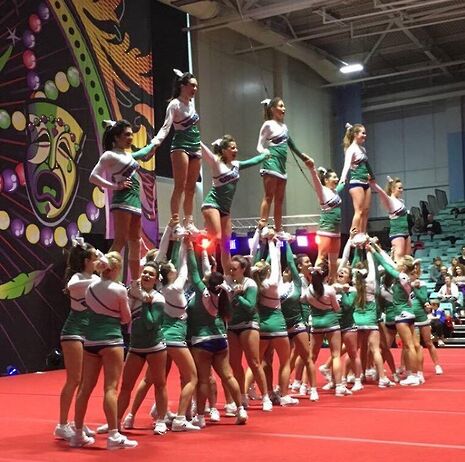Rogue Sport of the Week: Cheerleading with Maisie Payne
Keir Baker goes for a ‘C’ and a ‘H’ and an ‘A’ and a ‘T’ about cheerleading with the Cambridge Cougars’ Communications Officer

Athlete profile
- Name: Maisie Payne
- College: Selwyn
- Degree: PBS – 2nd Year
- Hometown: Norwich
Maisie Payne is a member of the Cambridge University Cheerleading Society, known competitively as the Cambridge Cougars. She is part of the squad that finished second at the Future Cheer national competition and second at the ICC Southern competition, as well as winning the ICE Cheerleading Competition in Luton. Maisie and the Cougars also won last year’s Varsity match against Oxford, which was Cambridge’s fourth Varsity win in a row. She is the Communications Officer on the Cambridge Cougars 2016/2017 Committee.
Can you give us a brief overview of cheerleading?
Competitive cheerleading is really different from people’s typical preconceptions of it, which I guess largely come from films. We compete as a squad of about 30 girls – though next year we’ll be entering a mixed-gender team – and there are judges who mark you on different skills. So you get judged on your building and stunts skills (lifting people above your head and throwing them about) and tumbling skills (like you see in gymnastics where they go from corner to corner doing lots of flips and cartwheels). You also get marked on your dance and jumps, so it’s got a little bit of everything.
Unfortunately, though, we get people saying it’s not a sport – the University don’t yet recognise it as a sport so we don’t have the funding to kick on to the next level. But we’re currently campaigning to rectify that: all you have to do is watch cheer routines to see that it should be considered a sport. After all, gymnastics is considered a sport and we do lots of the same things that they do!
How did you first get into cheerleading?
I was from a performing background: I had danced from the age of three to 18, and while I loved it, that is quite a long time, so when I got to Cambridge I decided I ought to try something a little different. My sister does cheerleading for her university and she’d raved about it, and I’d also already seen the Cougars perform at one of her competitions. So I tried a taster session and loved it – the variety of disciplines it requires and the solidarity the Cougars have definitely made me want to continue.
What is the hardest thing about the sport?
Stunts can be very tricky. They usually involve five people, and not only do you have to get it right because they’re quite dangerous, but you also have to time it with the other five or six groups too!
But the hardest thing is without a doubt getting through the full performance. In two and a half minutes, you have a dance, a set of jumps, a pyramid, two stunt sections and a tumbling section – it’s absolutely jam-packed and you don’t stop moving the entire time. So you need really insane fitness levels because you have to do it all with a smile on your face, looking really enthusiastic!
What traits help facilitate success in the sport?
The great thing about cheerleading is that no prior experience is needed at all, so the sport’s really accessible and we can get people up to scratch really, really quickly. Any previous gymnastics experience is useful, but you can be taught everything you need, except enthusiasm. Being able to count to eight is pretty handy too, just so you keep in time with the music!
What is the state of cheerleading in Cambridge, in the UK, and internationally?
People in Cambridge seem really keen: we just need to continue getting the word out that it’s more than just waving pom-poms about and convince the University to recognise us so that we can improve our funding. But we’ve been told that you can get half-Blue status after five Varsity matches, which is coming up for us next year, and turnout is really good: we usually have more people wanting to join the squad than the 30 we need. For example, when I tried out there were 50 people, so this year, we’re looking to have two teams!
On a national level, it’s really popular at universities, but it’s not just confined to them. There are quite a few all-star teams – teams that aren’t associated with a school but who still enter competitions – and you just have to know where to look for them. There are loads and loads in London in particular, and they take on people from all age groups who want to compete. People don’t quite realise how many there are!
Of course, it’s very big in America, as is stereotypically known. But it is universal – at the World Championships you get teams from all over the world and Japan are one of my favourites. But I doubt it will get anywhere near the Olympics (which is really depressing considering some of the other sports that you see) because of the name: it’s not taken seriously. In fact, there’s been talk of changing it’s name to something like ‘Cheersport’ to try and boost our chances!
What is your training schedule like?
Training is pretty intense. We do three days a week: two sessions of two hours actually cheerleading at the University Sports Centre, and another shorter session of conditioning, where we work on abs, squats and getting our cardiovascular fitness up. Anything else – like gym work or weights training – is up to the athlete.
How do you reconcile a Cambridge workload and your training schedule?
We train on a Thursday night, which means I have to skip Thursday Lola’s – which breaks my heart! Seriously, though, I use my time cheerleading as a break from work – though it helps that my course isn’t too intense. But others manage it, and it’s also worth saying that if you can’t take around six hours out of your week, you’re doing Cambridge wrong and not balancing your time properly.
How might somebody interested in cheerleading get involved?
They would get involved through the Cambridge University Cheerleading Society. We will have a stall on both days of the Freshers’ Fair and we’re running events throughout Freshers’ Week – we’ve got a taster session, a tryout and an event at Ballare too on the 2nd October! We have a website with extra information, and a Facebook page, Twitter and Instagram too so people can keep track of our competitions and training. And if anyone has any specific questions about cheerleading, they can email me (mp779@cam.ac.uk) too!
This interview has been edited for length and clarity.
 News / Colleges charge different rents for the same Castle Street accommodation2 March 2026
News / Colleges charge different rents for the same Castle Street accommodation2 March 2026 News / King’s hosts open iftar for Ramadan3 March 2026
News / King’s hosts open iftar for Ramadan3 March 2026 Theatre / Lunatics and leisure centres 4 March 2026
Theatre / Lunatics and leisure centres 4 March 2026 News / Angela Merkel among Cambridge honorary degree nominees27 February 2026
News / Angela Merkel among Cambridge honorary degree nominees27 February 2026 News / News in Brief: waterworks, wine woes, and workplace wins 1 March 2026
News / News in Brief: waterworks, wine woes, and workplace wins 1 March 2026








